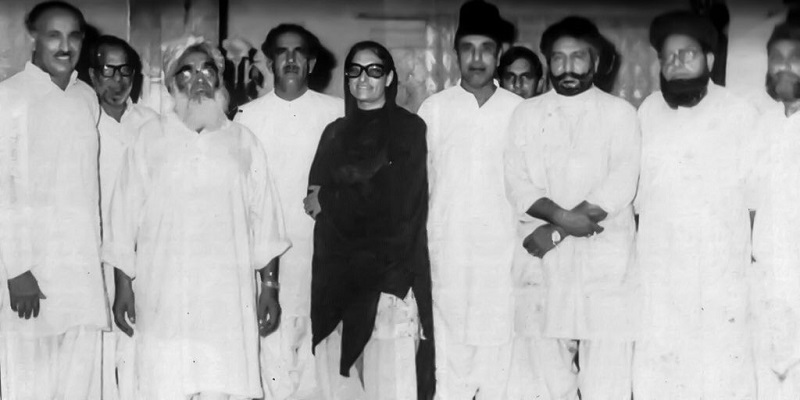Pakistan National Alliance: Catalyst for Change in 1970s Politics
The Pakistan National Alliance (PNA) played a significant role in the political landscape of Pakistan during the late 1970s. Formed as a coalition of various opposition parties, the PNA emerged as a powerful force that challenged the government of the then-Prime Minister Zulfikar Ali Bhutto. To understand the PNA, one must delve into the political context of the time, the events leading to its formation, its objectives, and the impact it had on the trajectory of Pakistani politics.
Political Context:
The 1970s were a tumultuous period in Pakistan's political history. The country had recently undergone a dismemberment, resulting in the creation of Bangladesh in 1971. The post-1971 period was marked by political instability and economic challenges. Prime Minister Zulfikar Ali Bhutto, who came to power in the aftermath of the Bangladesh crisis, faced a daunting task of rebuilding the nation.
Bhutto's leadership, however, was not without controversy. His style of governance, characterized by centralization of power and the imposition of martial law, drew criticism from various quarters. Additionally, allegations of election rigging in the 1977 general elections intensified the opposition's discontent.
Formation of the Pakistan National Alliance:
The discontent among opposition parties coalesced into the formation of the Pakistan National Alliance in 1977. The PNA was not a single political party but rather a coalition of nine opposition parties united against Bhutto's government. Prominent among these parties were the Pakistan People's Party (PPP) (headed by Nawaz Sharif at that time), the Jamaat-e-Islami, the Pakistan Democratic Party, and the Pakistan Mazdoor Kissan Party.
The alliance aimed to challenge what they perceived as electoral malpractices and authoritarianism on the part of the Bhutto government. The grievances of the PNA were not limited to electoral issues; they also protested against alleged human rights abuses and the suppression of dissent.
Objectives of the Pakistan National Alliance:
- Electoral Reforms: The primary objective of the PNA was to demand electoral reforms. They accused the Bhutto government of rigging the 1977 elections and sought a fair and transparent electoral process.
- Restoration of Civil Liberties: The PNA advocated for the restoration of civil liberties and democratic rights. They alleged that the government curtailed freedom of speech and assembly, leading to a stifling political environment.
- Economic Justice: Economic grievances were also part of the PNA's agenda. The alliance claimed that the government's economic policies disproportionately favored the elite and neglected the interests of the common people.
- End to Authoritarianism: The PNA sought an end to what they perceived as authoritarian rule under Bhutto. They demanded the repeal of martial law and the restoration of a more democratic form of governance.
PNA's Protests and the 1977 Elections:
The PNA's demands were articulated through mass protests and demonstrations across the country. The alliance organized a series of rallies, strikes, and sit-ins to mobilize public support. The protests reached their peak in early 1977, creating a charged political atmosphere in the country.
In July 1977, amidst escalating tensions, the Pakistani military, led by General Muhammad Zia-ul-Haq, intervened, overthrowing Bhutto's government in a bloodless coup. Bhutto was subsequently arrested, and martial law was imposed.
Aftermath and Impact:
The ousting of Bhutto marked a turning point in Pakistani politics. General Zia-ul-Haq assumed power and initiated a period of military rule that lasted until 1988. The PNA, having achieved its immediate
goal of removing Bhutto from office, faced challenges in maintaining unity and coherence in the post-Bhutto political landscape.
The PNA's role in shaping the political discourse persisted. The events of 1977 had a lasting impact on the democratic institutions of Pakistan. The alliance's demands for electoral reforms and civil liberties echoed in subsequent political movements, influencing the trajectory of democratic governance in the country.
Legacy of the Pakistan National Alliance:
- Democracy and Electoral Reforms: The PNA's demand for electoral reforms contributed to subsequent discussions about the need for a transparent and fair electoral process. The legacy of the PNA played a role in shaping conversations around free and fair elections in Pakistan.
- Role of Opposition: The PNA demonstrated the power of a united opposition in challenging the status quo. This lesson was not lost on subsequent generations of political leaders, and alliances among opposition parties continued to be a feature of Pakistani politics.
- Military's Role: The military's intervention in 1977 and the subsequent era of military rule under Zia-ul-Haq had a profound impact on Pakistan's political landscape. It set a precedent for military involvement in politics, influencing the country's political dynamics for years to come.
The Pakistan National Alliance, though a short-lived coalition, played a crucial role in shaping the political narrative of Pakistan during a critical period. Its demands for electoral reforms, civil liberties, and an end to authoritarianism resonated with a significant portion of the population. While the immediate aftermath saw a change in government, the long-term impact of the PNA was felt in the discussions surrounding democracy, electoral processes, and the role of opposition in Pakistan. The events of 1977 remain a key chapter in Pakistan's political history, illustrating the complex interplay between democratic aspirations, political dissent, and military intervention.

